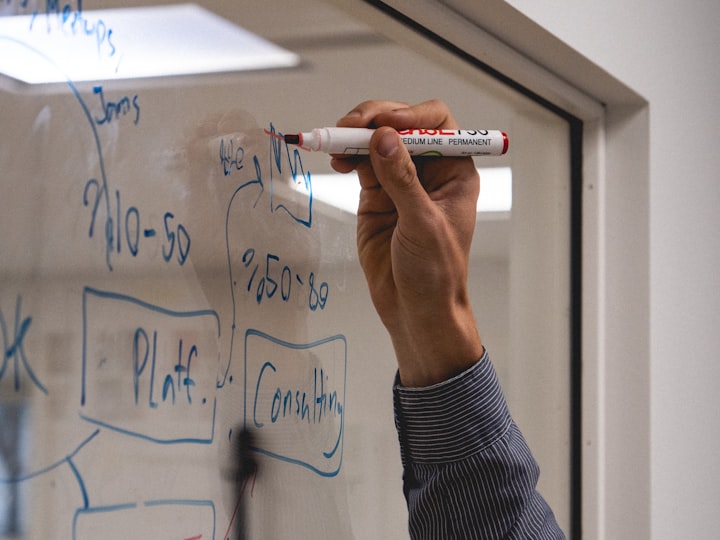How to Struggle Well
Options for changing unhelpful struggle into a helpful challenge and the joy of flow.

The moments that are most fulfilling in my life are often moments of flow. When people talk about flow, they commonly describe deep concentration, absorption, timelessness, and autotelic motivation (worth doing for its own sake). When you realize six hours have passed and you forgot to eat lunch, whatever you were doing is probably a flow activity for you. Have you ever had one of those moments?
The ingredients for flow vary but often include a clear motivating goal, achievable tasks, time and space to focus, some challenge, and a sense of accomplishment from the act of doing the work. For example, as I’m writing this piece, I’m trying to share helpful mental models and practices for struggling well in hopes that it will be helpful to a reader (clear motivating goal). I’m trying to weave it together into a compelling narrative, and will then proofread it and ask for feedback on Foster.co (achievable tasks). I’m drawing on all of the things I know, all of the things that I’ve read, and all of my experiences. I think I can make something helpful, but I feel like I’m stretching myself too (some challenge). And I’ve been working on this for hours but haven’t really noticed (time and space with a sense of accomplishment). Writing this is a moment of flow for me.
Put another way, I’m so excited and challenged and thus absorbed in what I’m doing right now that I forget those other parts of myself - my plans, my “shoulds,” my worries, and my self-judgments. I’m just existing in a state of doing - in a state of flow. When it happens, flow can be bliss.
Struggling Well
But what happens when those ingredients don’t come together to create a blissful state of flow? What happens when the challenge is too much? I think about it as a helpful challenge or an unhelpful struggle. Challenges stretch you out of your comfort zone and require you to focus and strive. It is a key ingredient because it takes all of your conscious attention which creates the selflessness and timelessness of flow.
On the other hand, an unhelpful struggle is when there’s too much challenge. Too much challenge can take on many forms. I often find that struggle shows up when there’s a big imbalance. It could be not having any clear options. Or it could be having too many options. It could be being overwhelmed by the amount of work that needs to be completed. Or it could be not having enough information or feedback to make a decision. It’s often in the extremes of challenge that things become an unhelpful struggle for me.
So what do you do where there’s so much struggle that it’s overwhelming? Or framed differently, how do you struggle well? Assuming there’s going to be some unhelpful struggle in your life, how do you prepare yourself with mental models, tools, and options for those moments so you can turn unhelpful struggle into a helpful challenge?
Self-Reflection
When I feel overwhelmed by a struggle, I often find it helpful to pause and reflect on the challenge to better understand it. I often find this step helps me gain perspective, clarifying what’s going on, my options, and what I might choose as a next step. I’m often just not giving enough time and space to a struggle, freaking out about it rather than curiously being with it. I find when I’m present and curious about a struggle, I can sometimes resolve it myself based on my own knowledge and wisdom.
I often conduct this self-reflection in my journal, asking myself and answering questions about the struggle. Although I’ve tried doing this through thinking alone, I find that journaling provides a more structured experience. I follow a pattern in my journal:
- Write down the struggle.
- Ask questions about the struggle to explore it from different perspectives and expand my understanding of it.
- Answer those questions and write down additional questions that arise.
- Brainstorm options that I could try as a next step, including options I’ve tried previously.
- Pick a next step to try.
- Try the next step, learning by doing and starting the reflection process again to learn from my experience.
If it’s a big struggle, I find that sometimes giving space between steps is helpful. For example, writing down the struggle and asking and answering a few questions. Then coming back the next day, answering additional reflection questions, and then moving into options. I find this time and space help me to be more objective and helpful to myself.
Conversational Journaling
I call this process Conversational Journaling because it’s like having a conversation with myself. There’s just something about approaching it like a conversation that I find helpful. It may sound crazy, but give it a try and decide for yourself. In fact, there’s a practice called Rubber Ducking that advises when you get stuck on a problem you should get a rubber duck, place it in front of you, and start talking about your problem. Often, seemingly out of nowhere, you’ll find an answer to your problem. It can certainly help. But I find that writing down and answering questions helps to structure the exploration from multiple perspectives and better captures the results. After all, how well you define a problem can determine how well you solve it - an idea popularized by Albert Einstein when he said “If I had an hour to solve a problem I’d spend 55 minutes thinking about the problem and five minutes thinking about solutions.” The questions you ask and answer about your struggle may be a key ingredient to how well you navigate it.
A Real Example
So what are examples of these questions I ask myself? As a recent example, I was considering if I wanted to join an early-stage startup and struggling to decide if it was a good fit for me. I struggled for a while, thinking about it a lot. I later realized that I was struggling because I had too many unanswered questions about the opportunity. How did I realize that? One night when I couldn’t get to sleep for hours, I realized I needed to try something else. So I got out of bed and wrote down some questions in my journal:
- What would it take for you to be “all in”? To be a “hell yes!”?
- What responsibilities would I want to have?
- What responsibilities would I want to not have?
- What resources would I need (ex. budget, team, etc)?
- What benefits would I need (ex. compensation, flexibility, location)?
- What would a typical day at work look like?
- What would most likely be the cause of my leaving?
I was surprised by how helpful it was to answer those questions. It didn’t resolve all my challenges, but it did help me to clarify my point of view and identify a few different options to try. I am often surprised by the amount of inner wisdom I can bring to situations and how it’s often more about making space to be with the problem and taking time to explore it.
Normally at the end of a journal entry like this, I have at least one next step to try. And that’s really all that matters to me - having a next step to try, trusting that in trying something I will learn more and find my way to the next step, and the next, and the next. As Yvon Chouinard founder of Patagonia says, “If I get an idea, I immediately take a step forward and see how that feels. If it feels good, I take another step forward. If it feels bad, I take a step back. I learn by doing.”
I’m exploring the power of Conversational Journaling and self-reflection through Onward.ly. If you’re interested in being part of this exploration, consider applying to join the Onward.ly Beta Club.
But sometimes I’m still left with a problem at the end of this process. I’m still stuck. And when that happens, I find it helpful to have a conversation with another person.
Having A Conversation
Talking with another person - a partner, friend, or co-worker - almost always helps me make progress through a challenge. Just saying “Hey, I could use some help with a challenge. Do you have a few minutes to help me?” These conversations often follow a similar pattern:
- I share the situation.
- The other person asks a few questions to help explore and expand our shared understanding of it.
- Then the person shares some options, advice, wisdom, and a story.
- And then I share what was helpful and what I’m going to try as a next step.
Perhaps you feel like asking for help but are worried you’re being a burden. I have these same thoughts, but experience has taught me that most people love sharing advice and wisdom. Also, sharing what you found helpful can be a really nice form of feedback to know what’s helpful to another person. I like to frame this feedback as an appreciation. For example, “Val I really appreciated that you helped me to name that I’m feeling like I’m not equal in this situation. I’m going to talk with Mike about it during our next 1:1.” It can also be helpful to follow up later after you’ve tried the next step to let the person know how it turned out. It’s a lovely form of appreciating the person’s time, energy, and wisdom by showing how you used what they shared with you.
In my own experience trying different practices like these, I’ve also got curious about the magic that sometimes happens in a conversation with another person that self-reflection doesn’t always include. I think it’s helpful to explore these aspects as a way to understand how different practices can be helpful for different challenges.
Clarity
For one, I think the way we express and explore our thoughts out loud can be different from when we’re expressing them in our thoughts or on paper. We’re trying to explain them in a way so that another person will understand. We’re likely adding nuance and detail because of this. Also, if the other person doesn’t understand something, they ask a question for clarification. Often, this is a question that also helps me clarify my understanding. That said, I find that it can be helpful to practice self-reflection before having a conversation to clarify what you already know and where you need the most help.
Diversity
Also, each person’s lived experience, knowledge, and wisdom are a bit different. I think of this as a form of diversity. And in that diversity are different points of view and different options. In sharing their diversity, another person can turn unknown unknowns into known unknowns and then knowns. This can reveal blind spots. This can also reveal options that lead to a next step that becomes a path forward.
Validation
And often, in the process of sharing and discussing my challenge the other person shares a similar challenge they’ve faced or perhaps are currently facing. And in that moment of realizing we have a shared struggle, I feel acknowledged and validated. I think and feel “I’m not alone” which is the normalization I need to stop ruminating about the past and take a next step even though it may be hard.
Takeaway
So the next time you’re stuck on a challenge, perhaps try self-reflection. And if that doesn’t work, have a conversation with someone about it. I’m not sure what you’ll find, but I’m pretty sure you’ll find something helpful. And I’m sure the other person will appreciate having an opportunity to be helpful and may just return the favor by asking you for help in the future. It’s in this way that we not only help ourselves but create the trust and connections of relationships and friendships that last for a lifetime.
What’s resonating here for you? What new options are you finding? What’s a next step you might try?
I’m exploring the power of Conversational Journaling and self-reflection through Onward.ly. If you’re interested in being part of this exploration, consider applying to join the Onward.ly Beta Club.
Tremendous appreciation and high fives 🙌 to Christine Cauthen and David Burt from Foster.co for collaborating on this post!



Comments ()